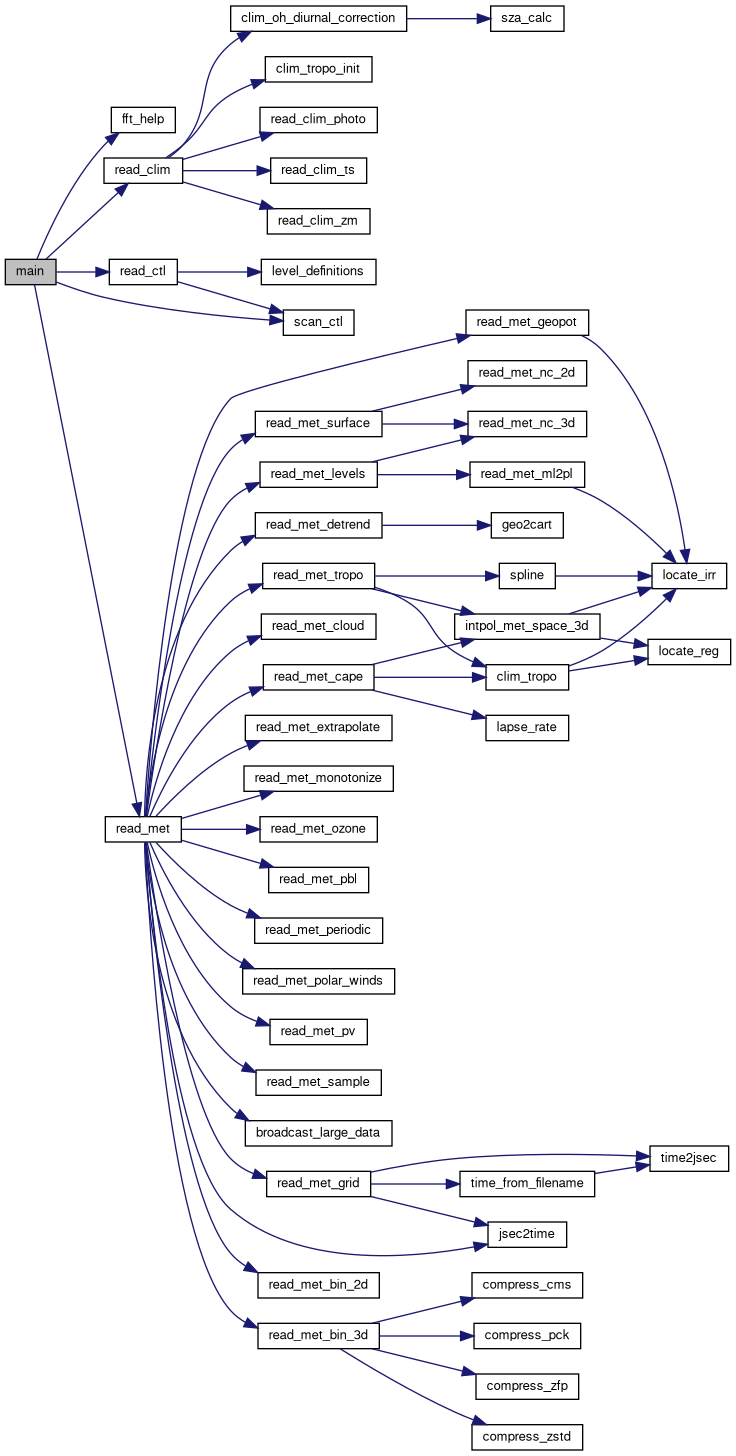29 {
30
32
34
36
38
39 FILE *out;
40
41 static double cutImag[
EX], cutReal[
EX], lx[
EX], A[
EX], phi[
EX];
42
43
47
48
49 if (argc < 4)
50 ERRMSG(
"Give parameters: <ctl> <spec.tab> <met0>");
51
52
54 const double wavemax =
55 (int)
scan_ctl(argv[1], argc, argv,
"SPEC_WAVEMAX", -1,
"7", NULL);
56
57
59
60
62 ERRMSG(
"Cannot read meteo data!");
63
64
65 LOG(1,
"Write spectral data file: %s", argv[2]);
66 if (!(out = fopen(argv[2], "w")))
67 ERRMSG(
"Cannot create file!");
68
69
70 fprintf(out,
71 "# $1 = time [s]\n"
72 "# $2 = altitude [km]\n"
73 "# $3 = longitude [deg]\n" "# $4 = latitude [deg]\n");
74 for (int ix = 0; ix <= wavemax; ix++) {
75 fprintf(out, "# $%d = wavelength (PW%d) [km]\n", 5 + 3 * ix, ix);
76 fprintf(out, "# $%d = amplitude (PW%d) [K]\n", 6 + 3 * ix, ix);
77 fprintf(out, "# $%d = phase (PW%d) [deg]\n", 7 + 3 * ix, ix);
78 }
79
80
81 for (
int ip = 0; ip < met->
np; ip++) {
82
83
84 fprintf(out, "\n");
85
86
87 for (
int iy = 0; iy < met->
ny; iy++) {
88
89
90 for (
int ix = 0; ix < met->
nx; ix++) {
91 cutReal[ix] = met->
t[ix][iy][ip];
92 cutImag[ix] = 0.0;
93 }
94
95
97
98
99
100
101
102 for (
int ix = 0; ix < met->
nx; ix++) {
104 / ((ix < met->
nx / 2) ? (
double) ix : -(double) (met->
nx - ix));
105 A[ix] = (ix == 0 ? 1.0 : 2.0) / (met->
nx)
106 * sqrt(gsl_pow_2(cutReal[ix]) + gsl_pow_2(cutImag[ix]));
107 phi[ix] =
RAD2DEG(atan2(cutImag[ix], cutReal[ix]));
108 }
109
110
111 fprintf(out,
"%.2f %g %g %g", met->
time,
Z(met->
p[ip]), 0.0,
113 for (int ix = 0; ix <= wavemax; ix++)
114 fprintf(out, " %g %g %g", lx[ix], A[ix], phi[ix]);
115 fprintf(out, "\n");
116 }
117 }
118
119
120 fclose(out);
121
122
123 free(clim);
124 free(met);
125 free(dd);
126
127 return EXIT_SUCCESS;
128}
void fft_help(double *fcReal, double *fcImag, const int n)
Computes the Fast Fourier Transform (FFT) of a complex sequence.
double scan_ctl(const char *filename, int argc, char *argv[], const char *varname, const int arridx, const char *defvalue, char *value)
Scans a control file or command-line arguments for a specified variable.
void mptrac_read_clim(const ctl_t *ctl, clim_t *clim)
Reads various climatological data and populates the given climatology structure.
int mptrac_read_met(const char *filename, const ctl_t *ctl, const clim_t *clim, met_t *met, dd_t *dd)
Reads meteorological data from a file, supporting multiple formats and MPI broadcasting.
void mptrac_read_ctl(const char *filename, int argc, char *argv[], ctl_t *ctl)
Reads control parameters from a configuration file and populates the given structure.
#define ERRMSG(...)
Print an error message with contextual information and terminate the program.
#define Z(p)
Convert pressure to altitude.
#define EX
Maximum number of longitudes for meteo data.
#define ALLOC(ptr, type, n)
Allocate memory for a pointer with error handling.
#define RAD2DEG(rad)
Converts radians to degrees.
#define LOG(level,...)
Print a log message with a specified logging level.
#define DEG2DX(dlon, lat)
Convert a longitude difference to a distance in the x-direction (east-west) at a specific latitude.
Domain decomposition data structure.
int nx
Number of longitudes.
int ny
Number of latitudes.
int np
Number of pressure levels.
float t[EX][EY][EP]
Temperature [K].
double lon[EX]
Longitudes [deg].
double lat[EY]
Latitudes [deg].
double p[EP]
Pressure levels [hPa].


